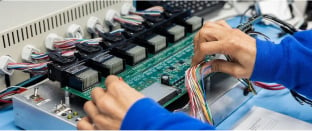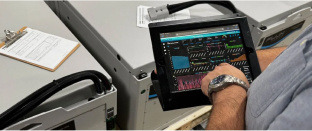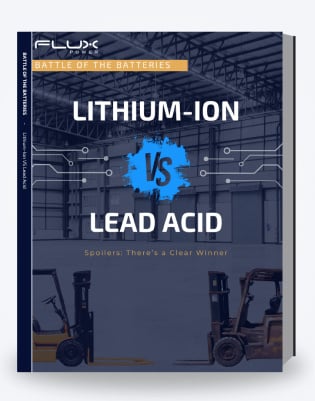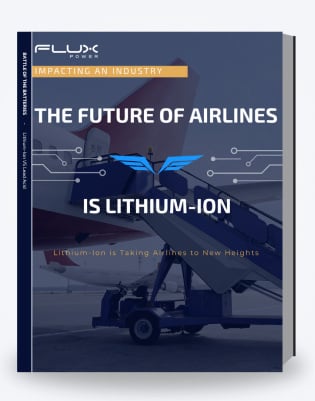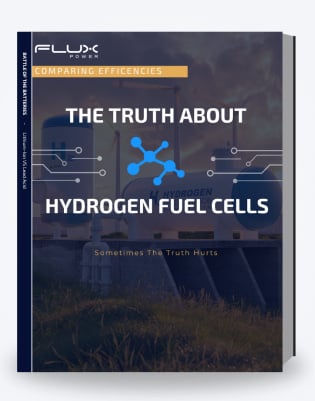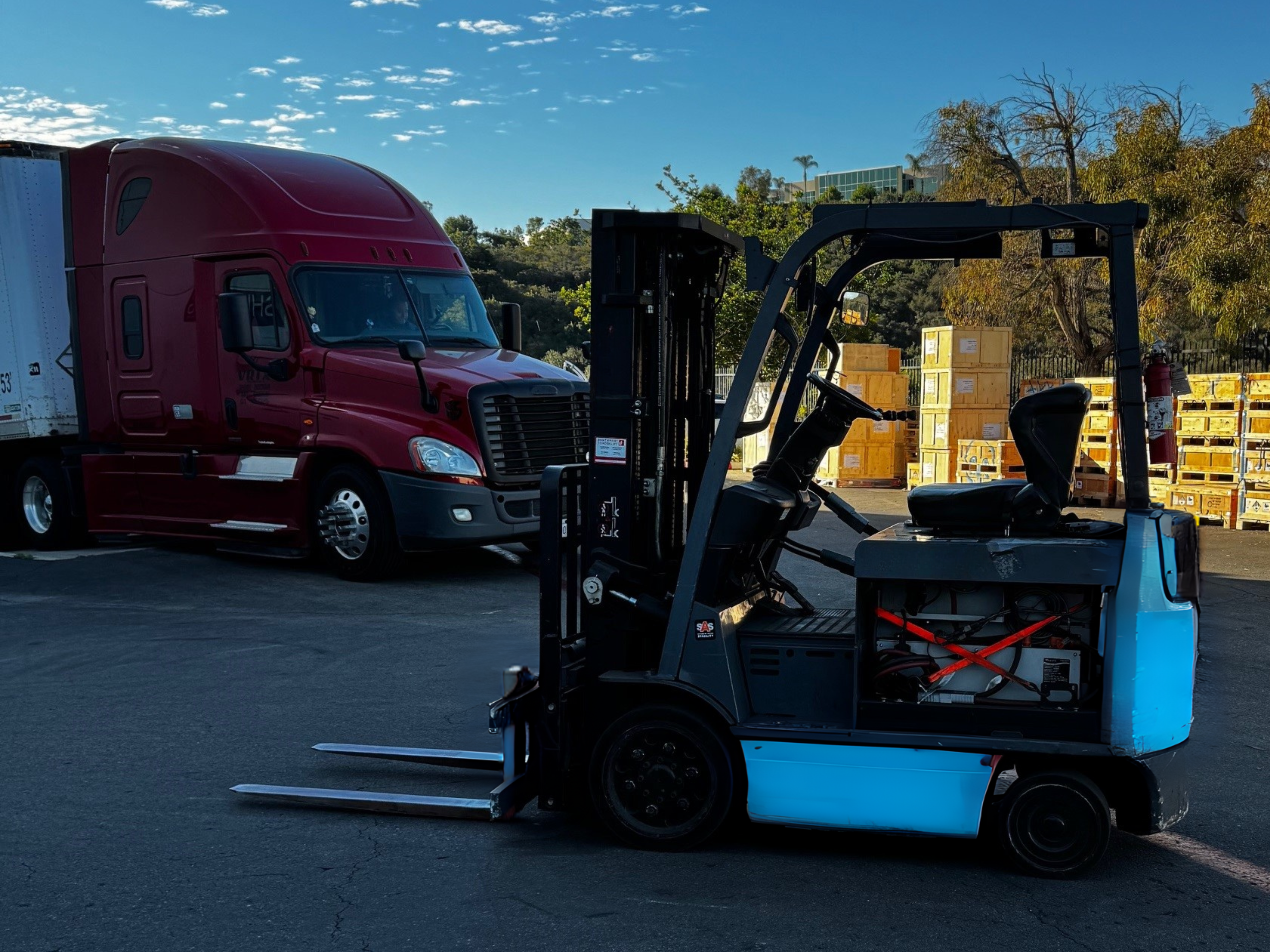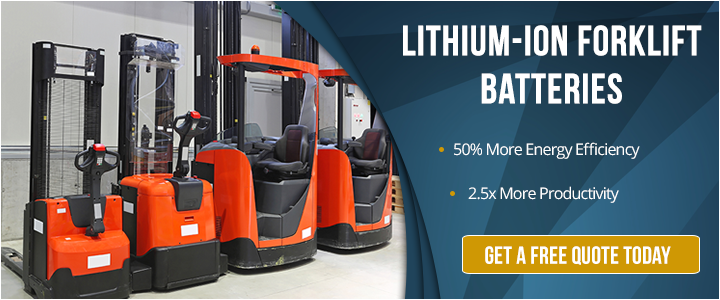Lithium-ion batteries are replacing lead acid batteries for forklifts at a rapid rate. It makes sense…lead acid batteries were invented in 1859.
Now these materials are being replaced by superior ones. Lithium-ion batteries were launched in 1991. That’s 130 years of innovation and scientific development that has led to a more advanced battery.
Let’s take a look at how lithium-ion batteries work, what they are made of and why they work best for forklifts.
What Are Lithium Battery Cells Made Of?
Lithium-ion batteries are primarily made of lithium-iron-phosphate. Inventors chose this particular mix of elements because it is one of the most stable lithium-ion battery chemistries on earth. Within a lithium-ion battery, there are a number of working parts: .png?width=347&name=Battery%20Modules%20(3).png)
- Temperature Sensors: These work to monitor the overall temperature of the battery; too much heat during use or charging can damage the battery.
- Voltage Tap: This checks the individual energy capacity for each cell within the battery.
- Voltage Converter & Regulator Circuit: These work in tandem to ensure the voltage and current stay at acceptable levels.
- Battery Charge State Monitor: This is the brains of the operations, a tiny computer that manages the entire charging process. It safeguards against combustion and overheating while working to charge the battery as efficiently as possible.
These complex parts are wrapped within three sheets of thin metal. The three metal sheets are a positive and a negative electrode with a separator between them.
The electrodes are composed of carbon and lithium-iron-phosphate, which are essentially inert. The electrodes are immersed in a solvent, typically ether, which functions as an electrolyte.
The electrolyte is the flammable component that can be problematic but only under rare circumstances. Batteries that are properly sealed pose no threat to anyone.
How Is It Assembled?
The process begins by assembling the cells into blades/buckets that fit the desired capacity and voltage of the battery being created (i.e. 24V 400Ah or 80V 300Ah etc.). Wiring is then placed on the cell taps to measure and communicate with the BMS (Battery Management System). The wiring is routed from the cell taps onto the electronics board. 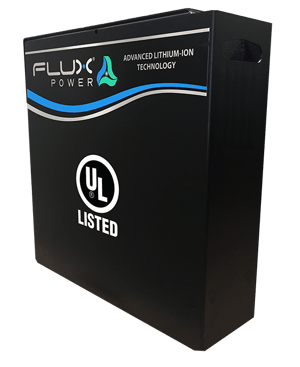
The electronics board holds the battery management system as well as other components that regulate the battery. The entire battery is then encased in a powder coated 10-gauge steel enclosure.
Benefits of Using A Lithium-Ion Battery Over Lead Acid
As we mentioned in the opening, lithium-ion batteries are fast replacing lead acid for forklifts, but are lithium batteries better and why?
Here’s a short breakdown by category of why lithium-ion batteries are superior to lead acid:
- Faster Charge: All lithium-ion batteries are capable of what is called a fast charge. A fast charge allows high amounts of energy into the battery until it reaches about 70%. The battery charge state monitor then slows the input, safely charging the remaining 30% at a slightly slower rate. Lithium-ion batteries are capable of this because they are more sophisticated than your average lead acid battery. Lead acid batteries actually go the other way. It takes them longer to charge the last 30% than the initial 70%, leaving you waiting around as opposed to getting things done.
- Longer Lifespan: On average, lithium-ion batteries have twice the lifespan than lead acid batteries! That also doesn’t take into account what is called discharge level. Discharge level relates to how the battery is treated over its lifespan. Batteries that are run until they are near dead will struggle to hold their charge over time and will have fewer cycles. Batteries that are charged often and not allowed to fall below 20% of their capacity will last longer. That is called discharge level. Lithium-ion batteries are less susceptible to losing cycles off their lifespan than lead acid batteries. Bottom line… lithium-ion batteries outlast lead acid batteries.
- Higher Sustained Voltage: Forklifts require a lot of energy or voltage. Not all batteries are capable of supplying the same voltage, especially aging batteries. Lead acid batteries are notorious for losing voltage or power throughout the day, even when they have plenty of charge left. That means your forklift will be sluggish and less responsive, which can be incredibly frustrating. Lithium-ion batteries maintain their power throughout the charge, giving you the long-lasting power you need to get things done.
- Safer: Lithium-ion batteries don’t require supervision while charging or a dedicated room, unlike lead acid batteries. Lead acid batteries are prone to overheating and also give off dangerous fumes while charging. That is why they not only need a dedicated charging room, but also need to be monitored in case of an accident. Take a look at our article, "The Top 5 Ways A Lithium-ion Battery Makes Your Forklift Safer," for a more detailed overview on safety.
- Maintenance Free: Lead acid batteries require regular “watering” to ensure a long life of use. That means every few cycles lead acid batteries must be cared for in a way lithium-ion never do. The watering process can be dangerous and ineffective, if not done exactly right.
- Cost Efficiency Long Term: Since lithium-ion batteries last longer, work more effectively, don’t require maintenance and charge faster, it isn’t rocket science why they are more cost-efficient than the lead acid variety.
Summary
Moving forward, businesses that use forklifts have the option of using outdated lead acid or more advanced lithium-ion batteries.
The advanced technology of lithium-ion batteries provides an opportunity for companies to improve the efficiency and safety of their operations and their employees.
Add to that lower costs long term and you can see why more and more companies are converting from lead acid batteries and embracing lithium-ion batteries for the power of their forklifts.

